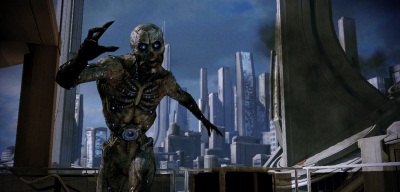E3 – Is Our Industry Too Content With ‘Safe’ Franchises?
Look at a list of biggest games of E3 this year and what do you see? Elder Scrolls V, Mass Effect 3, Modern Warfare 3, Battlefield 3, Killzone 3 and Uncharted 3 to name but a few. What do they all have in common? They are, of course, sequels in long running franchises. However does this signify lack of originality or is this simply the unique behavior of the gaming industry?
There are two different kinds of sequels in this list – some are direct continuations from previous installments while others are part of the same franchise, but only the name and perhaps the look and feel of the game remain continuous. Games like Mass Effect obviously demand a direct sequel, it does after all carry over the actions of the player from previous games. In a way, playing a sequel to the original Mass Effect is actually part of the player experience, as it heightens character development. However, other sequels can seem rather unnecessary.
Take the disappointingly named Halo 4 for example. As we all remember when we ‘finished the fight’ several years ago, all halos were successfully destroyed and the Master Chief has been drifting in deep space ever since. So why call this game Halo? Whatever the next game is, surely it should be vastly different to the previous three. We’re in unknown territory now, it would be immensely disappointing if we just end up with more of the same, and somehow, retaining the Halo name (and announcing a further two games) suggests that we will.
Now, the other side to this argument is that actually, there are plenty of games that use the name of a franchise for brand recognition. It is important for the consumer to be confident in their purchase, and if a name that they recognise is slapped on the box, particularly a popular one, it will undoubtedly sell more copies. Then again, why should a game sell because of a name? If it is good and the game is marketed correctly, then of course it will do well – L.A. Noire and Red Dead Redemption are perfect examples. Rockstar’s most recent blockbusters retain some elements of GTA, but the ad campaigns for both titles focussed on the unique features and stories they both introduced, making them strong enough stand apart from Rockstar’s most popular series.
Other titles, such as Bioshock Infinite, remain completely independent of the original title – the name suggests a style and quality of game rather than anything to do with the actual universe. Naming products in this way is becoming increasingly popular and is unique to the gaming industry.
Unfortunately, one of the downfalls of this kind of franchise development is the lack of new IP. There were only a handful of completely new products announced at E3’s major presentations this year, most of the conference time was devoted to talking about sequels, remakes and reboots. So what has happened? Why is the list of sequels getting bigger every year? Well, we’re now in the midst of the longest console cycle we have ever had – most of the ‘new’ franchises created this generation have been established, and while many developers try to do new things with their beloved sequels, no one seems to want to take any risks with totally new ‘core’ products.
Thankfully, there is hope – the vast majority of completely new content that was announced will be built for motion control. Titles like Ryse, Child of Eden and The Gunstringer demonstrate how motion control will encourage developers to attempt new projects. And the WiiU will undoubtedly throw developers right out of their comfort zone and give them the opportunity to create truly new and unique content.
This year may have been a quiet one for new game announcements, but developers definitely seem to be warming to the idea of motion gaming. For those craving something fresh, take solace in the fact that E3 2012 is definitely something to look forward to.
